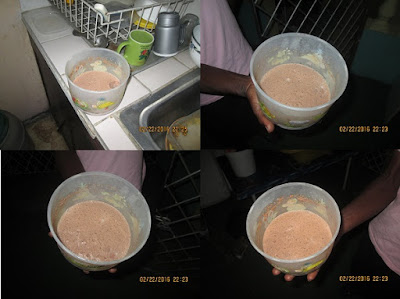As
an ardent ice cream lover, especially on a Sunday, I was quite surprised when
Lasco decided to launch their Ice Dream powdered Ice Cream product.
So
much so that I did a blog article predicting the eventual demise of Ice Cream
in Jamaica as per my blog article
entitled “How
JA$130 Lasco Ice Dream dessert mix will revolutionize the Jamaican Ice Cream
market”.
So
naturally I wanted to test it out. As soon as the product became available, I
purchased it at the Hi-Lo Supermarket for JA$110 on Friday February 19th
2016. Available only in Chocolate or Vanilla, I naturally chose chocolate for
my grand experiment with the gang on Sunday February 21st 2016.
The
instructions are very simple:
1.
Add 6.8 fl. oz. (200mL) of cold water
2.
Add entire sachet (130g) of Lasco Ice
Dream
3.
Mix using hand mixer on high speed for
two minutes or whisk for about 5 minutes until frothy
4.
Freeze for minimum of twelve hours
So
what was the result. As luck would have it, I took an awful lot of pictures!
Taste Test for Lasco
Ice Dream – Affordable Dream comes true for DIY Ice Cream lovers
My
setup was blessedly simple, with just my magic bowl and my fork as the mixer to
mix out the ingredients.
As
you can see below, I didn't use a hand mixer, just a regular fork.
After
mixing, I then went into the communal refrigerator along with my Ackee (that's
for laters!).
It
took awhile to freeze, roughly 12 hours, as my fridge isn't exactly a top of
the line model. But the end result was truly a surprise.
It
tasted exactly like Ice cream, sweet just like Chocolate Ice Cream with the same
texture and flavour. It had me thinking I could do this every Sunday at JA$110,
it's cheaper than buying a cup of ice cream in Swallowfield!
The
only thing I'd change is the use of gelatine, which I'd add to give it a bit
more body. Also you can add other flavours to make other types of ice cream.
You
can even use any liquid as the base, from Red Stripe Beer to Bag juice, even
Schweppes tonic wine to make it Glow-in-the-Dark Ice Cream as explained in my blog article
entitled “How
to make Glow-In-The Dark Ice Cream from Scratch - US$25.95 Zoku Ice Cream Bowl
makes Avatar The Last Airbender Frozen Novelties”.
Lasco
Ice Dream is truly a dream come true for Ice Cream lovers who like to DIY (Do
It Themselves)!












